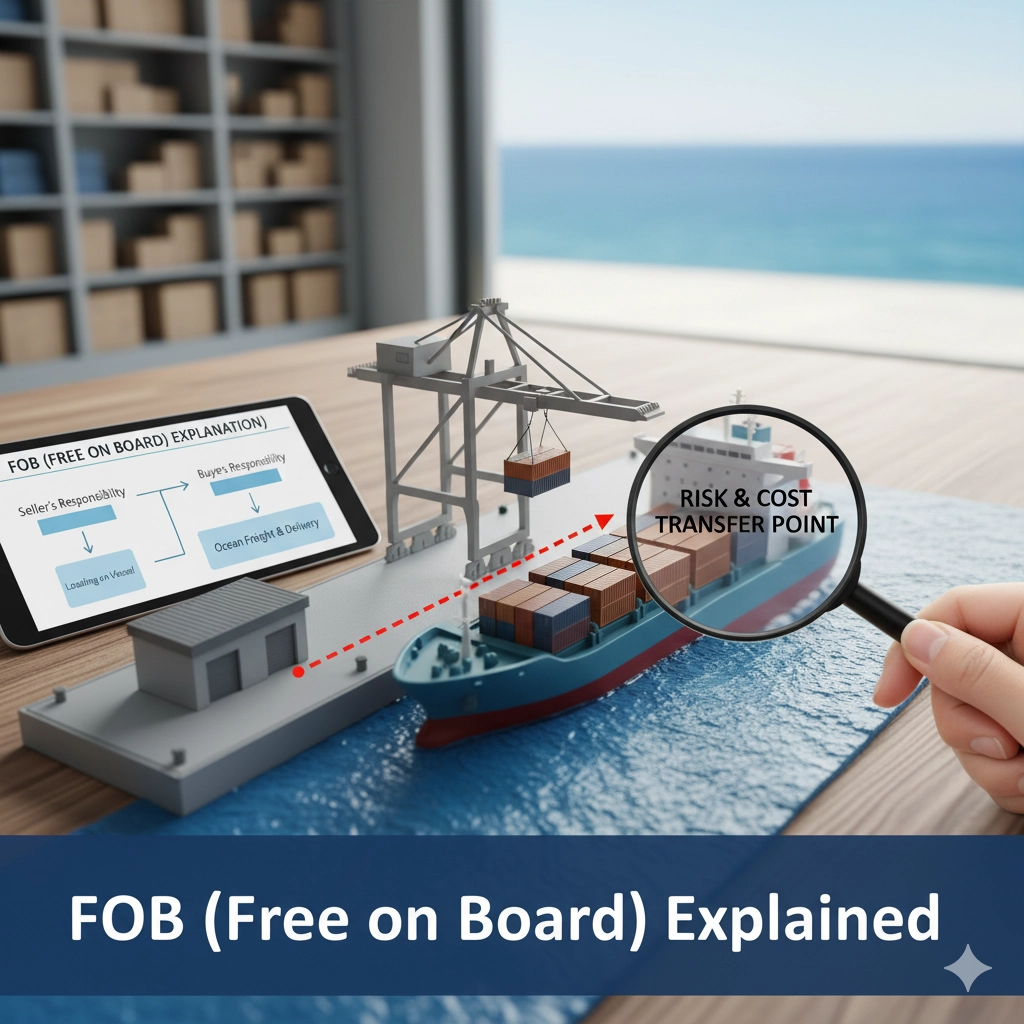
How FOB Works?
FOB (Free on Board) Explained
How FOB Works
Under FOB, the exporter delivers the goods to the port, clears them for export, and loads them onto the ship for shipment. At that point, responsibility shifts to the buyer. The importer arranges and pays for ocean freight, insurance, and inland transport after the goods are loaded.
Example: Dates FOB
A Canadian wholesaler purchases a 20-foot refrigerated container of Deglet Noor dates under FOB (Free on Board) terms. ZayDates delivers the container to Algiers Port and loads it onto the vessel. Once loaded, the importer assumes responsibility for ocean freight, marine insurance, and delivery to Canada.
Example: Olive Oil FOB
A European distributor orders bulk extra-virgin olive oil in flexible tanks. Once the flexi-tanks are loaded onto the vessel at Algiers, the buyer arranges their own insurance and freight to Rotterdam.
Advantages of FOB
- Control: Buyers choose their preferred shipping line, freight forwarder, and insurance provider.
- Cost savings (for experienced buyers): Direct contracts with shipping companies can sometimes be cheaper.
- Transparency: Importers know precisely what they are paying for freight and insurance.
Disadvantages of FOB
- Higher risk: Any delays or damages during transit are the buyer’s responsibility.
- Complexity: Requires importers to have strong logistics expertise and trusted partners.
- Cash flow impact: Freight and insurance payments are due earlier in the process.
CIF (Cost, Insurance, and Freight) Explained
How CIF Works
Under CIF, the exporter (ZayDates) arranges and pays for the freight and insurance until the goods reach the buyer’s port of destination. The buyer takes responsibility only after arrival.
Example: Dates CIF
A New York importer orders a 40-foot container of premium Deglet Noor dates on a CIF (Cost, Insurance, and Freight) basis. ZayDates delivers the container to Algiers Port, books the shipping, covers insurance, and ensures the container arrives at the Port of New York. The importer handles customs clearance and inland transport.
Example: Olive Oil CIF
A U.S. gourmet retailer imports glass-bottled olive oil on a CIF basis. Because bottles are fragile, the retailer prefers ZayDates to handle shipping and insurance. ZayDates coordinates temperature-controlled reefer shipping and secures marine insurance.
Advantages of CIF
- Convenience: Exporter manages freight, insurance, and logistics.
- Lower risk: Insurance is included, and risk transfers only at the destination port.
- Time savings: Importers focus on sales, not shipping complications.
Disadvantages of CIF
- Less control: Importers rely on the exporter’s chosen shipping partners.
- Potentially higher cost: Exporter’s logistics service may include a margin.
Cost Considerations: FOB vs CIF
The price difference between FOB and CIF depends on freight rates, insurance costs, and port handling fees.
- FOB often looks cheaper upfront, but inexperienced buyers may face surprise costs such as port handling, demurrage, or unexpected inland charges.
- CIF provides an all-in-one cost structure. While it may be slightly higher, it eliminates hidden charges and reduces administrative burden.
For example:
- A large food distributor with a global freight contract may prefer FOB to leverage their economies of scale.
- A mid-sized retailer importing olive oil for the first time may prefer CIF to avoid unexpected costs.
Which One Should You Choose?
FOB is best for:
- Experienced importers with strong logistics networks.
- Buyers with long-term freight contracts.
- Importers seeking cost transparency and willing to manage shipping risks.
CIF is best for:
- First-time importers.
- Buyers unfamiliar with Algerian ports and customs.
- Importers of fragile or sensitive cargo (like bottled olive oil).
- Retailers who prefer predictable landed costs.
Hybrid Approach
Some buyers use FOB for bulk shipments (e.g., 20 tons of industrial dates for food processing) and CIF for sensitive or retail-ready products (e.g., bottled olive oil or gourmet date confections).
How ZayDates Supports Both FOB and CIF
At ZayDates, we handle both Incoterms with professionalism and flexibility:
- FOB: We deliver goods to the port, handle export clearance, and provide seamless handoff to your forwarder.
- CIF: We manage freight booking, marine insurance, and delivery to your port. You only handle customs clearance and inland delivery.
Our logistics team ensures every shipment — whether dates or olive oil — is transported under optimal storage conditions:
- Reefer containers for dates (0–5°C to preserve freshness).
- Temperature-controlled tanks or secure glass packaging for olive oil.
By offering both FOB and CIF, we enable buyers to select the option that best suits their business model, risk tolerance, and level of import experience.
Conclusion
Choosing between FOB and CIF is one of the most critical decisions in international trade. For dates and olive oil imports from Algeria, it can mean the difference between a smooth, predictable process and an unexpected logistical headache.
For experienced buyers with established freight partners, FOB offers control and possible savings. For first-time or mid-sized importers, CIF provides peace of mind and simplicity.
At ZayDates, we guide you through both options — whether it’s a reefer container of Deglet Noor dates or a flexi-tank of Algerian extra virgin olive oil. With us, you don’t just buy a product; you gain a trusted export partner that ensures your goods arrive on time, fresh, and exactly as promised.
Ready to discuss your next shipment?
